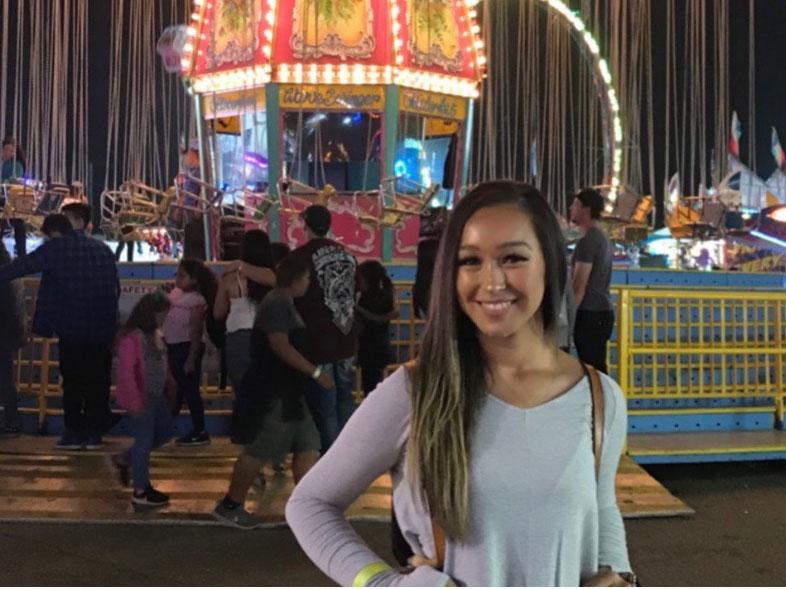Stephanie Rubio is just like any other student at Fresno State.
She likes to shop, go out for coffee and text her mom who lives in Arizona. She has two dogs, a beagle and a French bulldog and Boston terrier mix, whom she loves.
She is also deaf.
Rubio is the first deaf person at Fresno State to join a sorority. She pledged Delta Zeta this semester.
Not being able to hear hasn’t slowed the 27-year-old’s passion for learning or experiencing new things. Rubio thinks it is important for her to pave the way for other deaf students to feel empowered to do the same, she said.
“[Rubio] is showing everyone, deaf and hearing alike, that deaf people want to belong and gain the benefits of Greek life just like others do,” said Dr. Rosemary Wanis, a deaf professor of communicative sciences and deaf studies. “With access and accommodations, this dream can come true to college students.”
Rubio is a junior studying deaf education. After she graduates Fresno State, she plans to obtain her master’s degree from Gallaudet University, a school for the deaf and hard of hearing, in Washington, D.C.
In the meantime, however, she is looking forward to understanding what sisterhood really means.
“Is it someone you go shopping with?” Rubio said. “Someone you can talk to about anything? Is it someone you can do anything with?”
She hopes to bond with people like she has never done before. Since she isn’t from Fresno, Rubio is still trying to get connected.
Rubio will be the only deaf person in the sorority house, and although there are challenges, she is ready for them. She is grateful for students willing to learn more about the deaf and have a deaf sorority sister.
In the deaf community, “Big-D” deaf means that the deaf person speaks American Sign Language (ASL) and has a strong sense of identity within the deaf culture. When she was growing up she was “little-d” deaf, Rubio said. She didn’t have the sense of culture and identity and didn’t use ASL.
Before ASL and being involved with the deaf community, Rubio felt rejected and struggled with being deaf. When she went to the school for the deaf at age 15, her teachers told her to be proud of whom she is.
“I picked up sign language fast,” Rubio said. “All my peers, teachers, students, friends–everybody was deaf. It really just changed me. Deaf culture is where our identity comes from.”
Now that she has a language and a community, she is constantly learning and blossoming as a deaf person. Rubio is thankful that ASL is more accepted now. ASL is the third-most used language in the world, Wanis said.
Washington, D.C., opened the first signing Starbucks on Oct. 23, where the baristas, hearing and deaf alike, use ASL to communicate. For these reasons, Wanis said it is an exciting time to be deaf in the U.S.
There are many deaf people who go to mainstream public schools and don’t have the same deaf community.
“It would be great if there were more deaf teachers, so the kids were more exposed to the community, the culture and knowing the value of ASL,” Rubio said.
If Rubio could suggest one thing to hearing people, she said it would be to just be open.
“Sign language is our primary mode of communication,” she said. “Even if someone doesn’t know sign language, be open to it or open to even gesturing with a deaf person.”
Wanis said there are several ways Fresno State students can be more open and inclusive:
When you see deaf people at an event or in a classroom, they have to sit in front to see the interpreter. Go and sit with them. Ask the interpreter to interpret for you. Introduce yourself and include them in class or group discussions.
When you host an event, be sure to allow for a way for a deaf person to contact you to request accommodations.
Lastly, eye contact is important. The deaf person has to look at the interpreter to take in everything that is being said, but the deaf person still wants your eye contact to show that you see him or her.
“Deaf culture and ASL is a part of our campus community and the fabric of what makes the Central Valley so diverse and rich,” Wanis said.
Editor’s Note: We appreciate concerns brought forward regarding our story “Meet Fresno State’s first deaf sorority sister.”
After careful review, The Collegian has determined that a deaf student who belongs to the fraternity Sigma Alpha Iota does not belong to an official university-recognized sorority. However, the subject of our story, Stephanie Rubio, does in fact belong to a sorority recognized by the university and the Panhellenic Association — Delta Zeta.
If you have any questions or further concerns, email the editor at [email protected]





